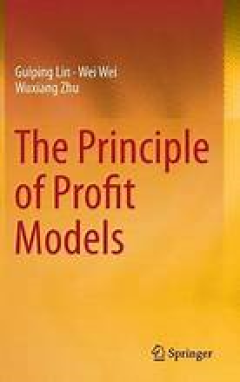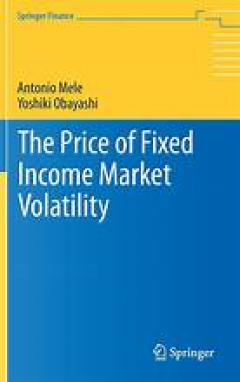Filter by

The Principle of Profit Models
This book mainly focuses on defining profit models, on how many main kinds of profit models there are, how profit models can change a company, and how to tailor a profit model to the needs of a certain company. In this context, profit models are classified as fixed-income, remaining-profit and profit-sharing, admission, toll, parking, fuel and sharing fees, profit sources, customer pricing, auc…
- Edition
- 1
- ISBN/ISSN
- 978-3-662-44714-7
- Collation
- XIV, 184
- Series Title
- -
- Call Number
- -

The Price of Fixed Income Market Volatility
Fixed income volatility and equity volatility evolve heterogeneously over time, co-moving disproportionately during periods of global imbalances and each reacting to events of different nature. While the methodology for options-based "model-free" pricing of equity volatility has been known for some time, little is known about analogous methodologies for pricing various fixed income volatilities…
- Edition
- 1
- ISBN/ISSN
- 978-3-319-26523-0
- Collation
- XI, 250, 7 b/w illustrations, 45 illustrations in colour
- Series Title
- Springer Finance
- Call Number
- -

Thermo-Hydro-Mechanical-Chemical Processes in Fractured Porous Media: Modelli…
The present book provides guidance to understanding complicated coupled processes based on the experimental data available and implementation of developed algorithms in numerical codes. Results of selected test cases in the fields of closed-form solutions (e.g., deformation processes), single processes (such as groundwater flow) as well as coupled processes are presented. It is part of the O…
- Edition
- -
- ISBN/ISSN
- 978-3-319-11894-9
- Collation
- -
- Series Title
- -
- Call Number
- -

Online Algorithms for the Portfolio Selection Problem
Robert Dochow mathematically derives a simplified classification structure of selected types of the portfolio selection problem. He proposes two new competitive online algorithms with risk management, which he evaluates analytically. The author empirically evaluates online algorithms by a comprehensive statistical analysis. Concrete results are that follow-the-loser algorithms show the most pro…
- Edition
- 1
- ISBN/ISSN
- 978-3-658-13528-7
- Collation
- XXVI, 185
- Series Title
- -
- Call Number
- -

Financial Economics
Financial economics is a fascinating topic where ideas from economics, mathematics and, most recently, psychology are combined to understand financial markets. This book gives a concise introduction into this field and includes for the first time recent results from behavioral finance that help to understand many puzzles in traditional finance. The book is tailor made for master and PhD student…
- Edition
- -
- ISBN/ISSN
- 978-3-662-49688-6
- Collation
- XI, 363
- Series Title
- Springer Texts in Business and Economics
- Call Number
- -

The Public Economy in Crisis
This Brief proposes a new theory of public economics which deemphasizes reliance on the free market and affirms the importance of public goods and services within the context of the democratic process and constitutional governance. Public non-market production makes up from a quarter to more than half of all economic activity in advanced democratic nation-states. Yet by imposing market precepts…
- Edition
- -
- ISBN/ISSN
- 978-3-319-40487-5
- Collation
- XV, 128
- Series Title
- SpringerBriefs in Economics
- Call Number
- -

Quantitative Ecology : A New Unified Approach
Quantitative Ecology introduces and discusses the principles of ecology from populations to ecosystems including human populations, disease, exotic organisms, habitat fragmentation, biodiversity and global dynamics. The book also reformulates and unifies ecological equations making them more accessible to the reader and easier to teach.
- Edition
- -
- ISBN/ISSN
- 978-1-946135-53-7
- Collation
- -
- Series Title
- -
- Call Number
- 570 LEH q

Integrating Human Capital with Human Development The Path to a More Producti…
For the most part, human capital theory emphasizes human cognitive development and the acquisition of knowledge and skills that enable enhanced productivity and earnings. In light of recent research findings, particularly concerning neurodevelopment and early childhood development, it is becoming apparent that this standard version of human capital theory has a far too limited conception of hum…
- Edition
- -
- ISBN/ISSN
- 978-1-137-45674-8
- Collation
- -
- Series Title
- -
- Call Number
- -

New Perspectives for Environmental Policies Through Behavioral Economics
This book presents essential insights on environmental policy derived from behavioral economics. The authors demonstrate the potential of behavioral economics to drive environmental protection and to generate concrete proposals for the efficient design of policy instruments. Moreover, detailed recommendations on how to use “nudges” and related instruments to move industry and society toward…
- Edition
- 1
- ISBN/ISSN
- 978-3-319-16792-3
- Collation
- XI, 335
- Series Title
- -
- Call Number
- -

Quantitative Problem Solving in Natural Resources
This text is intended to support courses that bridge the divide between mathematics typically encountered in U.S. high school curricula and the practical problems that natural resource students might engage with in their disciplinary coursework and professional internships.
- Edition
- -
- ISBN/ISSN
- -
- Collation
- -
- Series Title
- -
- Call Number
- 500
 Computer Science, Information & General Works
Computer Science, Information & General Works  Philosophy & Psychology
Philosophy & Psychology  Religion
Religion  Social Sciences
Social Sciences  Language
Language  Pure Science
Pure Science  Applied Sciences
Applied Sciences  Art & Recreation
Art & Recreation  Literature
Literature  History & Geography
History & Geography